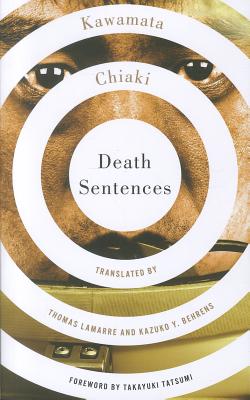
Death Sentences
by Kawamata Chiaki; translated by Thomas Lamarre and Kazuko Y. Behrens
University of Minnesota Press; 224 p.
Kawamata Chiaki’s novel, Death Sentences, is the first of his numerous works to be translated into English. I like horror and science fiction, so I was excited to read something lauded by William Gibson, an author quickly becoming something of a demigod among genre devotees. But I was also hesitant, knowing that works translated from the original Japanese (a la Haruki Murakami) can’t rely on their original melodies and thus take shape outside the author’s initial conception of the work. It is very much like listening to a piece of music composed for the piano performed with maracas and triangle—no matter how deftly—and knowing that you never fully hear the composition, though you get an idea of the shadow it casts.
I am not an expert on Japanese literature and admit I only made it halfway through 1Q84, but when a novel is described as “Like The Ring, but about poetry,” I had to read Death Sentences. The premise, for such a complex book, is quite simple: a poem written during the heyday of Surrealism in the 1940s is lethal to readers. Using a Midnight in Paris-like device, readers are treated to appearances by legends like André Breton, Marcel Duchamp and Salvador Dali. But the action skips back and forth from the time of the poem’s creation to 1980s Japan, where the secret police are trying in vain to control the rapid dissemination of the toxic poem “The Gold of Time.”
Death Sentences is a very smart depiction of information as epidemic, spreading exponentially with little chance of being contained. “The Gold of Time” functions quite well as a metaphor for information’s infectious qualities and the futility of containment, especially in the digital age. What results is a Lawrence Lessig-ian denial of the concrete nature of intellectual property, a story that bears witness to the very phenomenon that Lessig’s Free Culture seeks to legitimize: here is information; it is viral and it cannot be stopped, period.
Looking at the book through that lens imbues Chiaki’s first foray into the English market with inherent value, but it is ultimately undermined by how ridiculous “The Gold of Time” sounds after being translated. I am sure the novel’s translators did their best, but the poem is undeniably silly and only gets less threatening with repetition. I was on board with the idea that a poem could be horrible and murderous like a psychopathic serial killer or poltergeist, but found myself laughing at how ridiculous the actual poem was on the page. We are asked by Chiaki to believe that this piece of writing is dangerous—magical, even—but it is so utterly hilarious in English that the suspension of disbelief necessary to invest yourself in the process laid out by the author is all but impossible.
Read Death Sentences because more of Chiaki’s works ought to be available in English, and because he is a fantastic author who has written a book that can go from hard-boiled detective noir to a colony on Mars and still delight. But if you’re a horror junkie, don’t expect Death Sentences to keep you up at night.
There is a larger issue here beyond the novel, which I will put to you: do you think a piece of fiction about poetry that has been translated from its original language can succeed?

1 comment